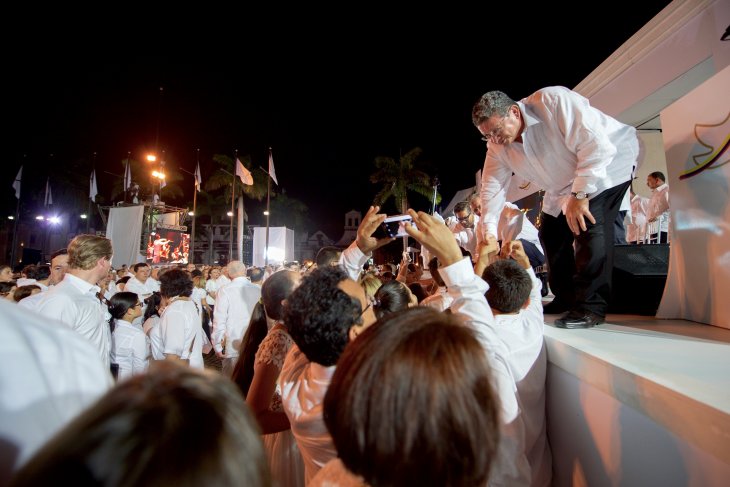In my special issue article “Building Civilian Militarism: Colombia, Internal War, and Militarization in a mid-term Perspective,” I talk about how civilian militarism became a large part of Colombian society over their years of internal conflict and how, within this context, Columbian civil society will be a key player in the success of the current post-conflict process.

Members of the FARC greet the crowd after Colombian President Juan Manuel Santos and FARC leader Timoleón Jiménez signed a peace accord as U.S. Secretary of State John Kerry sat in a plaza outside the Cartagena Indias Convention Center in Cartagena, Colombia, on September 26, 2016, while attending a peace ceremony between the government and the Revolutionary Armed Forces of Colombia (FARC) that ended a five-decade conflict. Photo credit: U.S. Department of State from United States (Members of the FARC Greet the Crowd) [Public domain], via Wikimedia Commons
During the peace talks and after the signing ceremony, several sectors of civilian elite Colombian society indicated opposition to the agreement, particularly on points regarding the place of former FARC combatants in politics, the Truth Commission, and land reform. There have even been calls to destroy the pact and take military action against FARC and remaining insurgency groups at the same time that right-wing criminal groups have earned conciliatory goodwill instead. Thus, dissent around the peace treaty has been fierce from some quarters, and has become a hot topic in the political debates around the 2018 presidential election campaigns. In this respect, an elite- but significant- part of Columbian society are openly challenging the negotiated peace treaty’s legitimacy as a form of conflict resolution after decades of suffering felt by more marginalized and vulnerable groups. This contradiction is highlighted by Yolanda Perea, one of the victims of the internal war who lamented that “those who oppose to the peace in Colombia, are the same, who watch the war on t.v.”
The current conflictual political climate is very disturbing for a society that seeks to move from a state of war to a state of peace. The situation can be understood by looking at the ongoing relationship and dynamics between Columbian civilian-militarism and a weak civil society. Both were present during the war and seem to have been a byproduct of widespread violence and insecurity, and the lack of leadership by political elites in building democracy over the years. On the one hand, civilian-militarism comes out of the tendency by Colombian political authorities to try to solve security problems through a hardline position supported by the armed forces and by taking measures to militarize police institutions and other aspects of society. For example, during the peace dialogues the Colombian Armed Forces had delegates in the negotiations and the current vice president of Colombia is a former top general of the highly militarized Colombian Police.
On the other hand, the fear and chaos produced by widespread violence and insecurity during the war, also contributed to this civilian-militarism through an ongoing justification of “national security logics”, which undermined attempts to consolidate a strong civil society in Colombia. Moreover, the negligence –or lack of interest- by political authorities to empower and protect civil society´s leaders became a normal aspect of Colombian society. Thus, to be a human rights´ activist, a journalist, a political dissident, a critical scholar, or even a normal citizen seeking to claim rights have become high-risk activities in Colombia, which is a clear disincentive against the formation of a strong civil society. This has fostered a general indifference among regular citizens and has contributed to the ongoing weakness of civil society actors in the current post-conflict process. Unfortunately, to keep the Colombian peace process alive, the active involvement of a strong (non-elite) civil society is required to support the peace agreement. It is thus very important to empower a broader civil society to play a role in demanding steady and progressive processes of demilitarization without ignoring the treatment of post-conflict threats to peace, or the possibility of new roles for the military and the police.